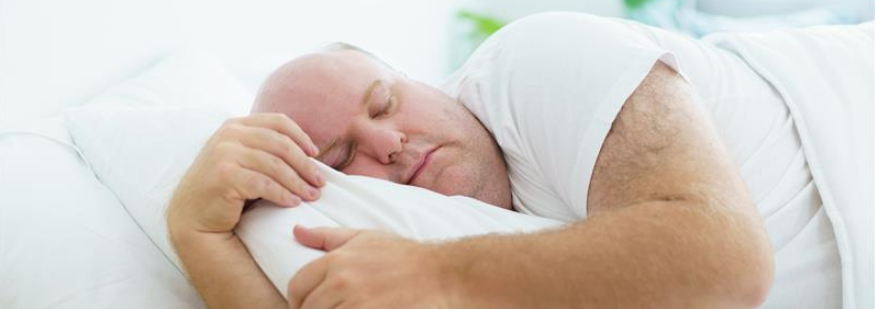If You Aren’t Getting Enough Sleep, You Are at Risk of Putting on Extra Pounds
When we want to lose weight or maintain a healthy weight, most people focus on diet and exercise. We watch what we eat, when we eat, and try to eat mostly healthy foods. And we make it a point to stay active by going to the gym, taking a walk, doing Pilates, or engaging in our favorite workout.
But there’s one other factor that helps control our weight: sleep.
Most adults need 7-8 hours of quality sleep per night. Studies show that poor sleep due to disorders such as sleep apnea can increase your risk for weight gain and obesity.
Robert Miller, a registered sleep technologist and vice president at Apria, says, “Not getting a restful sleep every night can have a profound effect on your life every day.”
Sleep Loss Raises Your Body Mass Index (BMI)
The body mass index, or BMI, is a screening tool that uses your height and weight to determine if you are at a healthy weight, underweight, overweight, or obese.
Sleep-deprived people have a higher BMI and tend to be either overweight or obese. This increases their risk for high blood pressure, diabetes, and cardiovascular problems.
Sleep Loss Affects Your Appetite
Our body produces hormones that help control our appetite. One is ghrelin, which tells your body when to eat. The other is leptin, which tells your body when you are full.
When you are sleep-deprived, you tend to have more ghrelin, which tells you to keep eating. And less leptin, which tells you to stop. So you eat more—often sugary—foods. And your weight surges.
Sleep Loss Slows Your Metabolism
Metabolism is a process your body uses to change what you eat and drink into energy.
Apria’s Robert Miller adds, “Research demonstrates that sleep-deprived people have increased hunger and appetite, especially for high-calorie, high-carb foods that may be harder to metabolize.”
Sleep Loss Causes Dehydration
Sleep deprivation not only affects your appetite but also your hydration level.
Being dehydrated slows your metabolism and affects the rate your body burns calories for energy.
Dehydration also makes you feel fatigued, meaning you’re less likely to exercise. The result: weight gain.
Sleep Loss Saps Your Energy
Everyone knows that exercise is critical to keeping weight off and staying healthy. Regular exercise also improves the quantity and quality of your sleep.
But when you are sleep-deprived, you have less energy to exercise. And if you do try to exercise when you are sleepy, you may be more apt to injure yourself.
Sleep Loss Makes You Moody
You know what it’s like after a bad night’s sleep. You’re tired, grumpy, depressed. You have trouble concentrating and remembering. You have a hard time getting along with people. And your judgment suffers, causing you to eat bad food to try to help you feel better.
Tips for Sleeping Better—and Keeping the Weight Off!
Follow these simple tips to help improve the quantity and quality of your sleep:
- If you have sleep apnea, talk to your doctor about getting a CPAP (continuous positive airway pressure) device. CPAP involves wearing a mask over your nose or mouth while you sleep. The mask is connected to a machine that delivers a constant flow of air to keep your airways open so you can breathe—and sleep—normally.
- Hydrate, hydrate, hydrate! Drink plenty of water during the day. But refrain from drinking water too close to bedtime to prevent frequent trips to the bathroom.
- Exercise regularly during the day.
- Don’t eat a rich, heavy meal before you go to bed.
- Do yoga, meditation, or relaxation exercises to reduce stress. Stress causes some people to overeat to help cope with their negative feelings.
- Keep a regular sleep schedule. Go to bed and get up at the same time each day.
- Keep your bedroom comfy—dark and quiet. Turn off your cell phone, tablets, and computers at least 30 minutes before you turn in.
- Before you go to bed, take a warm bath or shower to relax your muscles.
- Don’t drink coffee or alcohol before bedtime. The caffeine will keep you up.
- During the day, try not to nap—or limit naps to no more than 30 minutes.
- Don’t go to bed until you are tired!
Sleep More, Weigh Less!
Robert Miller sums up: “When you get the sleep you need along with proper diet and exercise, you are more likely to maintain a healthy weight, which improves your quality of life.”
If you are having trouble sleeping or if you are gaining unwanted weight, work with your doctor to create a plan where you see gains in the quantity and quality of your sleep—not your waistline!
Sleep apnea impacts more than just your waistline—know how sleep apnea impacts your life, and what you can do to help stop it.

.png)


.png)
